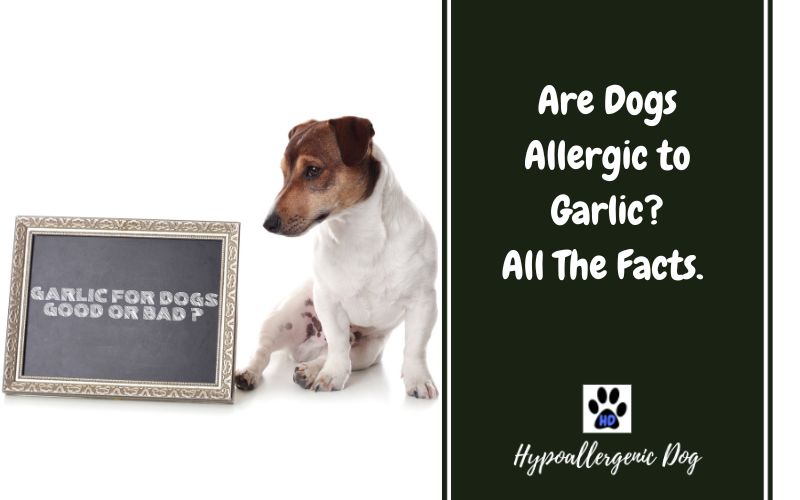Are Dogs Allergic to Garlic? — Vegetable Allergies
Food allergies can be tricky to diagnose in animals. Most food manufacturers have focused on the mighty ‘grain-free’ range, which is brilliant. But, what if your dog consumes a vegetable that disagrees with them?
Are dogs allergic to garlic, broccoli, or other plant-sourced foods?
The best way to identify what your dog could be sensitive to is to eliminate it from their diet and see if their symptoms improve. So, let’s unpick the popular veggies to see if there is a common reaction and which foods to avoid.
Are Dogs Allergic to Garlic? Contents
What Does a Food Allergy Look Like?
What Does a Food Allergy Look Like?
A food allergy can appear at any point — even from frequently-consumed foods. A reaction occurs because the body thinks the food is a threat to the system and fights whatever has been eaten to protect itself. Dogs have become more sensitive to these allergens, and over the years more owners have become aware of what to look out for.
Food Allergy Symptoms
Signs of food allergies can display differently in each dog but look at the following list as a precaution. Note: not all these symptoms may appear for your dog to be suffering from a food allergy.
- Bald patches.
- Face rubbing.
- Coughing.
- Biting of paws.
- Chronic ear infections.
- Skin infections.
- Chronic gas.
- Skin rashes.
- Difficulty walking.
During this article, we’ve researched what vegetables can be healthy for your dog and which ones may be unsafe for them to eat.
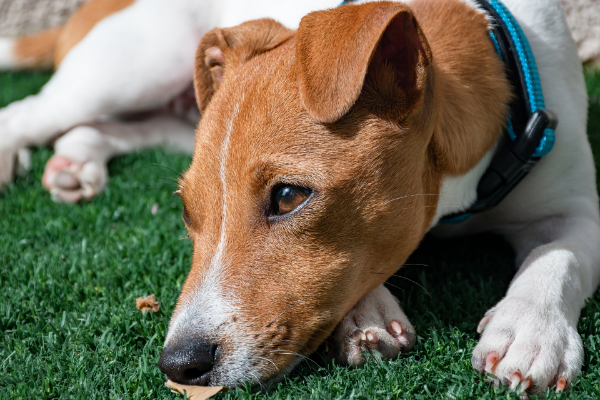
Are Dogs Allergic to Garlic?
If your dog reacts from eating garlic, it’s highly likely that it’s down to poisoning as opposed to an allergic reaction.
Garlic is a part of the allium group and shouldn’t be fed to your dog — it can cause a toxic reaction, leading to the destruction of red blood cells.
If the unfortunate happened, your canine companion could experience:
- Diarrhea.
- Vomiting.
- Loss of appetite.
- Abdominal pain.
- Dehydration.
Some signs of toxicosis don’t manifest straight away, they could take several days to develop:
- Abnormal breathing.
- Increased heart rate.
- Jaundice.
- Blood in urine.
Instances of toxicosis are generally associated with consuming concentrated forms, like garlic powder or larger quantities. Studies have shown around 15 to 30 grams per kilo of doggy body weight can lead to poisoning. To give you a rough idea, one clove of garlic weighs around 4 to 7 grams.
In short, if your dog ate garlic, it’s best to err on the side of caution and seek medical advice.
Other Food Allergies — What Vegetables Can My Dog Eat?
Now we’ve unveiled how garlic can be a danger to your dog. Are there other veggies that could pose a potential risk?
Are Dogs Allergic to Asparagus?
Asparagus isn’t known to pose any risk to your dog and is unlikely to cause any gastrointestinal reactions. It sits in the ‘nontoxic’ category, so you can feel confident knowing that chewing on this vegetable won’t do them harm. However, there are a couple of points to think about before tossing your beloved bow-wow a stalk or two.
Have you ever eaten asparagus raw? No? Well if you have, you’ll realize that it’s extremely tough, even for dogs. Hence, if you’re planning on feeding your furry friend this veggie, boil it to soften the stalk. That said, doing so reduces the choking risk, but will decrease the nutritional value. In short, there are better dog-friendly vegetables out there.
Are Dogs Allergic to Broccoli?
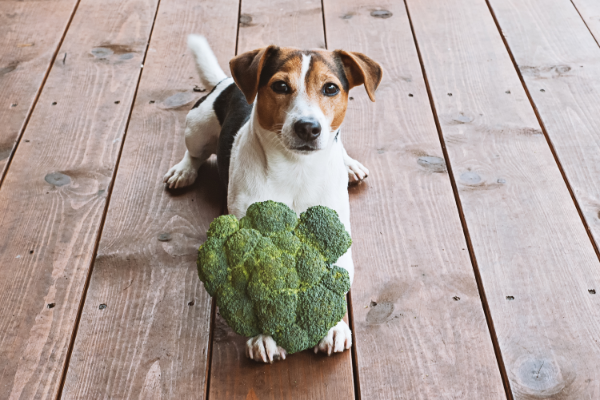
Broccoli is a good treat for the special canine in your life. They can chow down on it cooked or raw. This cruciferous vegetable contains dog-tastic nutritional benefits — it’s bursting with fiber and vitamin C. Perfect as a treat for a doggie that’s weight watching.
However, there are a few downsides, such as the florets of broccoli containing isothiocyanates. Too much of this ingredient can harm our dogs, leading to mild to severe gastric issues. But, in small amounts broccoli is totally fine.
Can Dogs Be Allergic to Carrots?

When my pup was teething, the only thing saving my furniture was a carrot! I found them to be a great chewing toy plus a delicious snack. But, are dogs allergic to carrots?
The answer to this question is yes, they can be. Yet, if you’ve been feeding your dog Bugs Bunny’s favorite food with no side effects, carry on. Full of fiber and vitamin A, they can offer amazing benefits to your dog’s diet.
As you may be aware, any dog can potentially react to any food — even if they’ve been eating it regularly with no previous issues. Hence, always keep in mind the symptoms of food allergies above.
Are Dogs Allergic to Corn on the Cob?
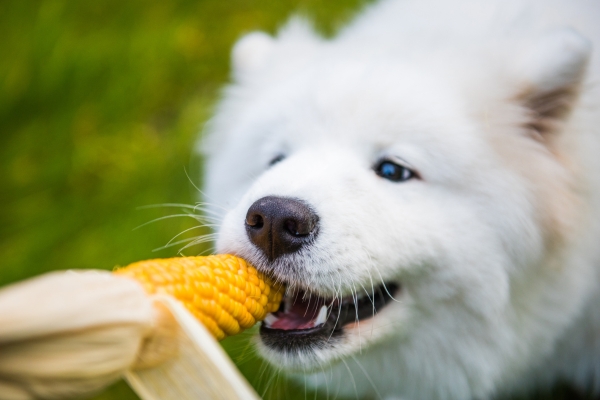
Corn on the cob has graced our tables for generations. If you’re anything like my family, you realize that it can literally be a side to any meal! With this in mind, can our dogs consume this tasty veggie without us having to worry about a reaction?
This veggie is actually a really healthy option for dogs. However, it must be removed from the cob, that part isn’t digestible for dogs and could cause a blockage.
Now, a corn allergy in dogs isn’t as common as chicken or grain allergies, but it can happen.
Are Dogs Allergic to Mushrooms?
The mushroom — a familiar fungus that’s a pizza topping favorite or ideal for bulking out a stir-fry or pasta dish. They may have become a staple ingredient to boost your culinary skills but can we offer them to our furry friends?
The good news is the mushrooms you buy from the store — for example, button, portobello, baby bella, and shiitake aren’t dangerous to your dog. However, they mustn’t become a regular ingredient in your dog’s food. If they eat too much of this vegetable, they may experience a stomach upset.
On the other hand, wild mushrooms aren’t advisable. Thus, if you find any on your nature walks in wooded areas, the advice here would be — keep your pooch well clear.
If your dog woofs down a wild variety, it could lead to severe diarrhea, vomiting, and in extreme cases, seizures. Consumption of wild mushrooms can result in a very poorly pooch and in some cases, pose a fatal risk.
A few species of wild and toxic mushrooms include:
- Death cap.
- Destroying angel.
- Deadly galerina.
- False parasol.
- Jeweled death cap.
- Jack o’lantern.
If you want to see what they look like, check out this short video:
<embed>
Are Dogs Allergic to Onions?
The onion plant is another ‘no go’ when adding ingredients to your dog’s food bowl. Every part of the onion plant can pose a risk to your beloved bow-wow. So, if your dog eats onions by accident and becomes ill, poisoning is probably the cause — not allergies.
Like garlic, the toxins present in onion can cause damage to your dog’s red blood cells — reducing the ability to carry oxygen around the body. This destructive process is known as hemolysis, resulting in hemolytic anemia.
Bear in mind — anything that includes onion flavoring or powder must also be kept away from your dog.
Can My Dog Be Allergic to Sweet Potatoes?
Deemed a superfood, the wondrous sweet potato is an orange delight packed with healthy vitamins and minerals. A perfect addition to any meal! Is this the same for dogs? Can the sweet potato pose a risk? The answer is simple…no. They’re low in calories and fat.
As with many other fruits and vegetables, sweet potatoes shouldn’t take the place of protein in your dog’s diet. What’s more, even though they’re packed with so much goodness — too much of a good thing can potentially cause an allergic reaction or intolerance.
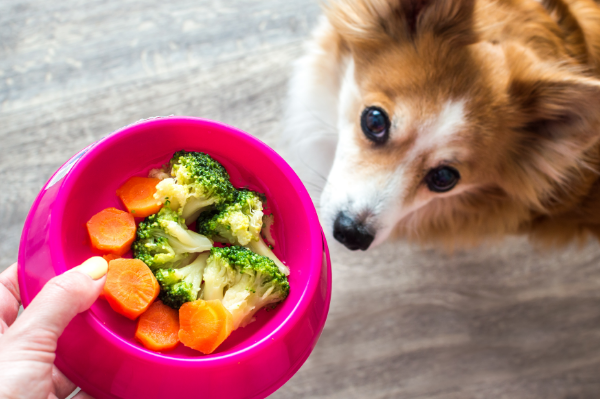
Conclusion
Allergies to vegetables can present themselves in many different ways — after all, every dog is unique. Hence, whenever you introduce a new food to your doggy’s dinner plate, you should be on the lookout for the telltale signs.
Dogs are considered omnivores, which means they can eat both meat and plant-based foods. However, some are toxic to canines, and thus should be avoided, and others are fine when consumed in moderation.
If anyone asks you, ‘are dogs allergic to garlic, onions, or wild mushrooms?’ The simple answer is, not so much allergic, but they can be toxic to your dog. So do Fido a big favor and avoid adding them to their menu.
Are Dogs Allergic to Garlic or Veg? FAQs
Can I Feed My Dog Vegetables Every Day?
Absolutely. In fact, offering your dog access to fresh doggy-friendly vegetables daily is encouraged — but ensure that it’s a varied offering. And, that it doesn’t replace the protein element.
Is Potato Good for Dogs?
Potatoes are classed as a safe vegetable for you to offer your dog. However, you must ensure they’re cooked. You can offer them boiled, baked, or even roasted.
What Happens When Dogs Eat Garlic?
If your dog has eaten garlic, they may be showing the following symptoms.
- Vomiting.
- Diarrhea.
- Extreme tiredness.
- Pale gums.
- Elevated heart rate and breathing.
- Excessive drooling.
Can Dogs Eat Cheese?
Cheese is very high in fat, and if you feed your dog too much, it can lead to obesity. Although moderate portions are considered safe, be sure not to feed it on a regular basis, doing so can cause pancreatitis, which could have a fatal outcome.

